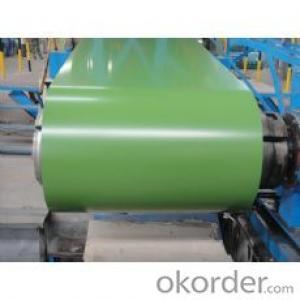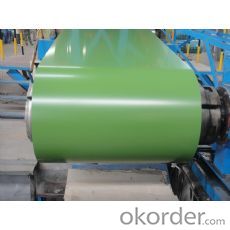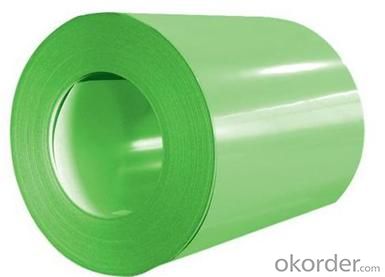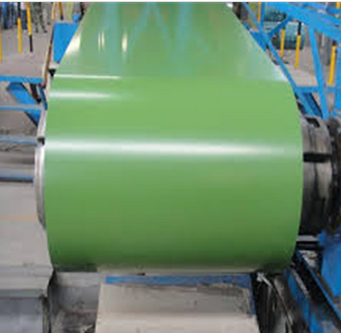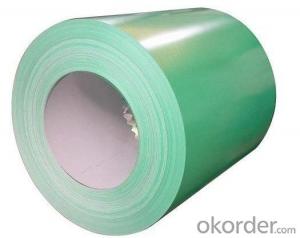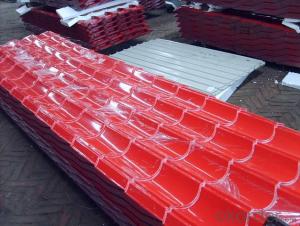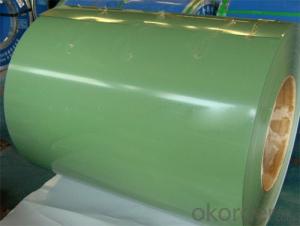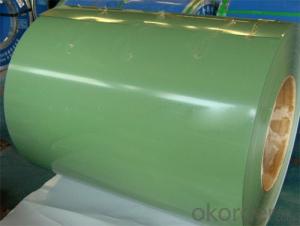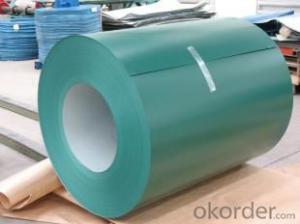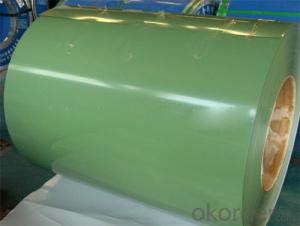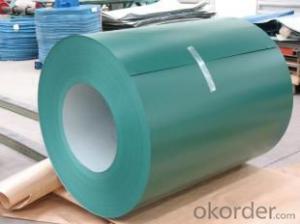Pre-Painted Galvanized Steel Sheet or Coil Prime Quality Green Color
- Loading Port:
- Shanghai
- Payment Terms:
- TT OR LC
- Min Order Qty:
- 200 m.t.
- Supply Capability:
- 10000 m.t./month
OKorder Service Pledge
OKorder Financial Service
You Might Also Like
1. Pre-Painted Galvanized/Aluzinc Steel Coil Description:
With GI as base material, after pretreatment (degrease and chemical treatment ) and liquid dope with several layers of color, then after firing and cooling, finally the plate steel is called pre-painted galvanized (aluzinc) steel. Pre-painted galvanized steel is good capable of decoration, molding, corrosion resistance. It generally displays superior workability, durability and weather resistance.
2.Main Features of the Pre-Painted Galvanized/Aluzinc Steel Coil:
• Excellent process capability
• Smooth and flat surface
• Workability, durability
• Excellent heat resistance performance
• High strength
• Good formability
• Good visual effect
3.Pre-Painted Galvanized/Aluzinc Steel Coil Images
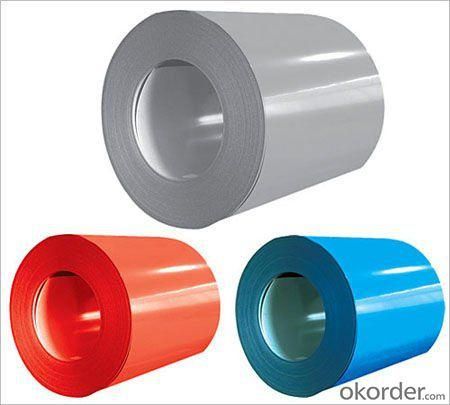
4.Pre-Painted Galvanized/Aluzinc Steel Coil Specification
Standard: AISI, ASTM, BS, DIN, GB, JIS
Grade: DX51D, DX52D
Thickness: 0.17-2.0mm
Brand Name: KMRLON
Model Number: coil
Type: Steel Coil
Technique: Cold Rolled
Surface Treatment: Coated
Application: Boiler Plate
Special Use: High-strength Steel Plate
Width: 20-1250mm
Length: customized
commoidty: pre-painted galvanized steel coil
Thickness: 0.13-4.0mm
width: 20-1250mm
zinc coating: 40-180g/m2
printing thickness: top side: 20+/-5 microns, back side: 5-7 microns
color: all RAL color
surface treatment: color coated
coil weight: 4-7 tons
coil ID: 508/610mm
packaging: standard seaworthy packing
5.FAQ of Pre-Painted Galvanized/Aluzinc Steel Coil
1. What’s the application of this product?
Roof, roof structure, surface sheet of balcony, frame of window, etc.
2. What’s the brand of the paint?
We use the best brand of all of the word—AKZO.
3. How about your company?
A world class manufacturer & supplier of castings forging in carbon steel and alloy steel,is one of the large-scale professional investment casting production bases in China,consisting of both casting foundry forging and machining factory. Annually more than 8000 tons Precision casting and forging parts are exported to markets in Europe,America and Japan. OEM casting and forging service available according to customer’s requirements.
4. How to guarantee the quality of the products?
We have established the international advanced quality management system,every link from raw material to final product we have strict quality test;We resolutely put an end to unqualified products flowing into the market. At the same time, we will provide necessary follow-up service assurance.
5. How long can we receive the product after purchase?
Usually within thirty working days after receiving buyer’s advance payment or LC. We will arrange the factory manufacturing as soon as possible. The cargo readiness usually takes 15-25 days, but the shipment will depend on the vessel situation.
- Q: can anyone tell me the way to bring back the shine to the stainless steel kitchen sink . It has become dull.
- A stainless steel kitchen sink is durable, easy to keep clean and disinfect, and will only grow more beautiful with age - if you take proper care of it. Clean the sink with soapy water, or a stainless steel cleaner (Spray N Sheen Stainless Steel Cleaner/Polish/Protectant) once or twice a week. Once or twice a month, fill the sink half full with a 50/50 solution of bleach and water or a special stainless steel cleaner (Stainless Steel Cleaner). Let it soak for about 15 minutes, then wash the sides and bottom and let it drain. Remember to wipe dry when done.
- Q: How are steel coils used in the production of steel tanks?
- Steel coils are an essential component in the production of steel tanks. These coils, which are typically made from high-quality steel, serve as the primary raw material for manufacturing steel tanks. The first step in the process is to unroll and flatten the steel coils, which are usually delivered in a coiled form from the steel mills. Once the coils are unrolled, they are then cut into specific lengths and widths, depending on the desired dimensions of the steel tank. These cut pieces are then molded and shaped into the different components of the tank, such as the cylindrical body, the top and bottom ends, and any additional fittings or accessories. The steel coils provide the necessary strength and durability to the tank, ensuring that it can withstand the rigors of its intended application. The quality of the steel used in the coils is crucial, as it determines the tank's resistance to corrosion, pressure, and external forces. Moreover, the use of steel coils allows for efficient and cost-effective production of steel tanks. The standardized nature of the coils ensures consistent quality and dimensions, resulting in a streamlined manufacturing process. The ability to cut the coils into precise lengths and widths also minimizes wastage and maximizes material utilization. Furthermore, steel coils offer flexibility in terms of design and customization. They can be easily formed and welded into complex shapes, allowing for the creation of tanks with varying sizes, capacities, and configurations. This versatility makes steel coils an ideal choice for producing tanks for diverse sectors, including industrial, commercial, and residential applications. In summary, steel coils play a crucial role in the production of steel tanks. They provide the necessary raw material for manufacturing various tank components, ensuring strength, durability, and customization. By utilizing steel coils, manufacturers can efficiently produce high-quality tanks that meet the specific requirements of different industries.
- Q: What are the different types of steel coil coating materials?
- Some of the different types of steel coil coating materials include polyester, polyvinylidene fluoride (PVDF), polyurethane (PU), epoxy, and silicone-modified polyester (SMP). These coatings offer various properties such as corrosion resistance, weatherability, durability, and aesthetic appeal.
- Q: this is for a school project due morrow can u please answerwhat are disadvantages of stainless steelplease also show were u got info ty
- Disadvantages Of Stainless Steel
- Q: What's the best way to clean granite countertops and stainless steel appliances? My countertops especially always look dull and streaky. Thanks!!!!!!!
- The best home remedy for that is shaving cream. Use men's shaving cream, not the gel, and not the ones with aloe, but regular shaving cream. It'll get the crud off and it'll shine it up for you. Just make sure you wipe it down really well, so there aren't any streaks.
- Q: How are steel coils used in the production of steel clamps?
- Steel coils are used in the production of steel clamps as they serve as the main raw material for creating the clamps. The steel coils are first processed and transformed into the desired shape and size through cutting, bending, and shaping processes. These coils are then formed into the clamp's body, providing the necessary strength and durability. Overall, steel coils play a crucial role in manufacturing steel clamps by providing the essential material for their construction.
- Q: How are steel coils used in the production of metal buildings?
- Steel coils are an essential component in the production of metal buildings as they are used to create the structural framework and outer cladding. These coils are unrolled and cut into sheets, which are then shaped and formed into various building components such as beams, columns, and panels. The strength and durability of steel make it an ideal material for constructing metal buildings, ensuring they are capable of withstanding harsh weather conditions and providing long-lasting structures.
- Q: what is the difference between metal and steel
- well, steel is a type of metal. It's sort of like asking the difference between a bug and an ant, an ant is a bug, but not every bug is an ant. Likewise, steel is metal, but not all metal is steel. Gold is metal, Silver is metal, Iron is metal, Steel is metal.
- Q: What are the different steel coil packaging methods?
- There are several different steel coil packaging methods, including using steel strapping or banding to secure the coils, using plastic or metal end caps to protect the edges of the coils, and using wooden or steel pallets to stack and transport the coils. Additionally, some steel coils may be wrapped in protective film or paper to prevent damage during shipping and storage.
- Q: Well actually I was just wondering why people were bashing on stainless so much for katanas. I heard that they don't hold their edge as well as carbon steel blades or Damascus steel. So what makes it so inferior to carbon or other types of steels?
- Stainless okorder /.. More flex will make the sword more resistant to vibration, which can occur from air friction, as well as from tameshigiri. Further, it'll be easier to keep and maintain a good edge on a sword less prone to breaking.
Send your message to us
Pre-Painted Galvanized Steel Sheet or Coil Prime Quality Green Color
- Loading Port:
- Shanghai
- Payment Terms:
- TT OR LC
- Min Order Qty:
- 200 m.t.
- Supply Capability:
- 10000 m.t./month
OKorder Service Pledge
OKorder Financial Service
Similar products
Hot products
Hot Searches
Related keywords
